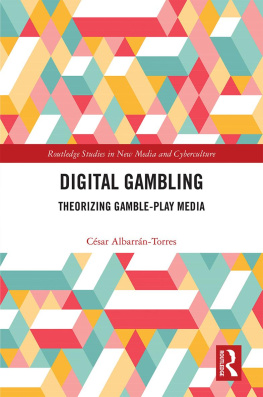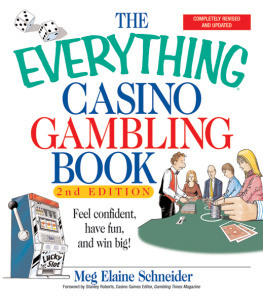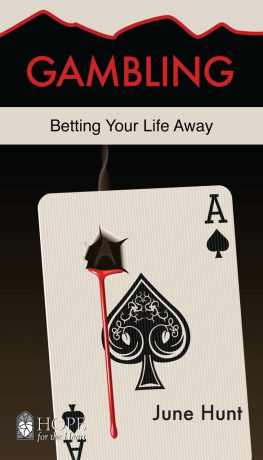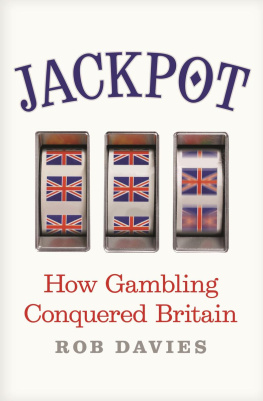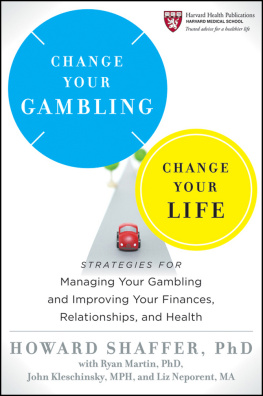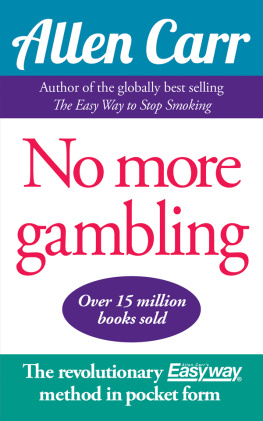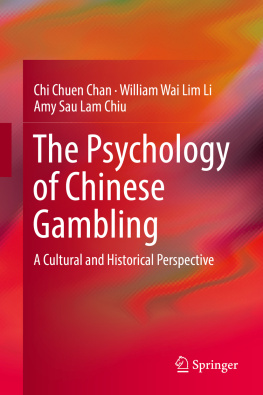Digital Gambling
I am thrilled to recommend a book that is essential reading for students and scholars working across gambling and gaming studies. At last, we have a rigorous, creative and thought-provoking study to help us make sense of proliferating platforms and products that are blurring the lines between entertainment and investment in everyday life. Albarrn-Torres concept of digital gamble-play is quite literally a game-changer.
Fiona Nicoll, Research Chair in Gambling Policy with the Alberta Gambling Research Institute and the Department of Political Science at University of Alberta, Canada
This book develops the concept of gamble-play media, describing how some gambling and gambling-like practices are increasingly mediated by digital technologies. Digital gambling brings gambling closer to the practices and features of video games as audiovisual simulations structure users experiences. By studying digital gambling from media studies, video game and cultural studies approaches, this book offers a new critical perspective on the issues raised by computer-mediated gambling while expanding our perspective on what media and gambling are. In particular, it critically analyses terrestrial, mobile and online slot machines; online poker; and stock trading apps through a selection of case studies.
Csar Albarrn-Torres is Lecturer in Media and Communications at Swinburne University of Technology, Australia.
Routledge Studies in New Media and Cyberculture
34 The Politics of Ephemeral Digital Media
Permanence and Obsolescence in Paratexts
Edited by Sara Pesce and Paolo Noto
35 Studying Digital Media Audiences
Perspectives from Australasia
Edited by Craig Hight and Ramaswami Harindranath
36 Between the Public and Private in Mobile Communication
Edited by Ana Serrano Tellera
37 Performing Digital Activism
New Aesthetics and Discourses of Resistance
Fidle A. Vlavo
38 Online Activism in Latin America
Edited by Hilda Chacn
39 Becoming-Social in a Networked Age
Neal Thomas
40 Free Software, the Internet, and Global Communities of Resistance
Sara Schoonmaker
41 Gay Men, Identity and Social Media
A Culture of Participatory Reluctance
Elija Cassidy
42 Digital Gambling
Theorizing Gamble-Play Media
Csar Albarrn-Torres
For a full list of titles in this series, please visit www.routledge.com.
First published 2018
by Routledge
711 Third Avenue, New York, NY 10017
and by Routledge
2 Park Square, Milton Park, Abingdon, Oxon OX14 4RN
Routledge is an imprint of the Taylor & Francis Group, an informa business
2018 Taylor & Francis
The right of Csar Albarrn-Torres to be identified as author of this work has been asserted by him in accordance with sections 77 and 78 of the Copyright, Designs and Patents Act 1988.
All rights reserved. No part of this book may be reprinted or reproduced or utilised in any form or by any electronic, mechanical, or other means, now known or hereafter invented, including photocopying and recording, or in any information storage or retrieval system, without permission in writing from the publishers.
Trademark notice: Product or corporate names may be trademarks or registered trademarks, and are used only for identification and explanation without intent to infringe.
Library of Congress Cataloging in Publication Data
CIP data has been applied for.
ISBN: 978-1-138-30385-0 (hbk)
ISBN: 978-0-203-73069-0 (ebk)
Typeset in Sabon
by codeMantra
For Gabriella, David and Isabel: home
To my academic mentors,
Chris Chesher, Gerard Goggin and Peter John Chen (University of Sydney)
Fiona Jean Nicoll (University of Alberta)
Tom Apperley (Deakin University)
This is how I became interested in exploring digital gambling as a media form. The first time I walked into an Australian pub in 2010, something caught my eye: a room framed by neon lights and suggestively called the VIP Lounge. Two golden Chinese dragons framed the red sign. This space, in Sydneys Chinatown, was clearly demarcated from the rest of the venue, and patrons entered the room discreetly. I assumed something illegal or of an erotic nature was taking place in that room. Needless to say, I did not enter the VIP Lounge that first time, worried that it might somehow jeopardise my reputation.
However, after noticing similar spaces in almost every pub I walked past or visited, I finally pushed the door into the enigmatic VIP Lounge. I was not expecting what greeted my eyes: a series of animated slot machines in perfect rows, displaying video game-like imagery and showcasing high-tech 3D graphics and animations. It was unlike anything I had seen before. Up until 2009, slot machines had been uncommon in Mexico, my home country, and the gaming machine industry turned out to have a very short honeymoon with the authorities. In late 2013, President Enrique Pea Nieto increased scrutiny on slot machines. The country, riven by drug-related violence, had seen an increase in slot machine gambling since 2010, with many casinos being rumoured to be running as money laundering sites for the cartels (Animal Poltico, 2013; El Universal, 2017). However, stricter rules on the gaming machine industry havent prevented it from running up to 90,000 devices in the country as per the latest counts (Ziolkowski, 2017).
A fully regulated space related to gambling, such as the Australian VIP Lounge, was, for me, foreign and fascinating.
The space resembled the game arcades of my childhood, and the devices reminded me of titles such as Donkey Kong (first released by Nintendo in 1981), the first iterations of Mario Bros (developed by Nintendo in 1983) or Street Fighter (launched by Capcom in 1987). The VIP Lounge triggered a feeling of nostalgia. The devices themselves demanded physical actions similar to the ones involved in other forms of interactive entertainment, such as pinball machine playing: the slot machine player pushes a button, activates a mechanism and waits for an outcome determined by chance. Smith and Abt have written about the gambling roots in pinball (1984, p. 130) and how in this game, the contest seems to be human against machine or computer surely an archetypal confrontation in twentieth-century America (1984, p. 131). Outcomes in a pinball game are triggered by chance events and then determined by the players level of skill, just like in some forms of gambling, such as poker. Smith and Abts appraisal of the cultural meaning of pinball machines reveals how gaming devices are able to synthesise history and culture. Where pinball is an expression of the human vs. machine archetypical confrontation (Smith & Abt, 1984, p. 131), gambling devices such as slot machines distil this confrontation into a pure and fun ritual of chance.
I would later find out that slot machines are known as pokies in Australia and New Zealand, and that they are networked, complex devices that look deceptively archaic. Two leading Australian scholars on gambling cultures, policy and gaming machine addiction, Richard Wooley and Charles Livingstone wittily describe contemporary slots as a 1960s Volkswagen equipped with a Ferrari motor (Woolley & Livingstone, 2010, p. 46). In the VIP Lounge, gamblers sat quietly in front of these machines, pushing a series of buttons time after time. Animated reels rolled. Gamblers celebrated or silently cursed their fate, mumbling swear words (Bugger!). Others stood there, motionless, sipping their pints of beer. The screens showcased fantastic characters and strange, kitsch versions of mystical environments that included the North Pole, ancient Egypt, the Australian outback and the Aztec empire as well as John Wayne, a kangaroo, Cleopatra, buffalos, polar bears, a Native American chief and a moustached Mexican revolutionary (a clichd representation that I was certainly troubled by!). Titles such as

